THE GABON MINI-SERIES
One-stop page for all my articles on Gabon, which is currently transitioning from military rule back to civilian governance while keeping the ruling Bongo Dynasty intact
IMPORTANT NOTE: This write-up is primarily intended for new readers of my Substack. Older readers, already familiar with my writings on Gabon, can use it to refresh their knowledge of political events in the petroleum-rich Central African country while awaiting my fourth article on the subject.
I will publish the aforementioned new article sometime after the Gabonese Presidential Election set to take place on 12 April 2025. That election is poised to transform Brigadier-General Brice Nguema from a military junta leader to an elected civilian President, thus reinstating the proper civilian governing format of the ruling Bongo family.
To save readers from having to expend time searching my Substack archives, I have converted this post into a one-stop web page hosting links to all published articles on Gabon. When a new article on Gabon is published, I will update this page with the relevant hyperlink. You can gain direct access to this omnibus page by clicking the relevant tab on the navigation panel of this blog as demonstrated above.
I. BACKGROUND
I have been closely monitoring the political situation in Gabon ever since the June 2009 death of President Omar Bongo Ondimba, the patriarch of the ruling Bongo Dynasty.
Omar Bongo (born Albert-Bernard Bongo) was a Flight Captain in the French Air Force when the French Colossus Charles de Gaulle handpicked him to become Vice-President of then-nominally independent Republic of Gabon, which had been granted its “sovereignty” as part of the wider decolonization programme forced on a reluctant France by the United Nations.
In the aftermath of the Second World War, European countries came under pressure from the United Nations (UN) to grant independence to their colonies. The financially bankrupt Brits agreed to wrap up their colonial empire and began granting independence, starting with India (1947), Pakistan (1947), Ceylon (1947), Burma (1948), Ghana (1957), Malaya (1957), Singapore (1958), Nigeria (1960), etc.
In response to pressure from the United Nations (UN) to initiate the decolonization process, recalcitrant Spain and Portugal amended their constitutions to fully integrate the colonies into their sovereign territories as “inseparable overseas provinces”.
Portuguese troops began a shooting war with pro-independence guerrillas in its African colonies. Portugal also resisted India’s December 1961 invasion of Portuguese Goa until it was useless to continue after the British refused to provide any help, as stipulated by the terms of the Anglo-Portuguese Treaty of 1373 and Anglo-Portuguese Alliance of 1386, both of which constitute the oldest continuously existing bilateral alliance of all time.
After losing their last colonial holdings in South Asia, the Portuguese armed forces concentrated on their counterinsurgency operations in the African colonies until 1975.
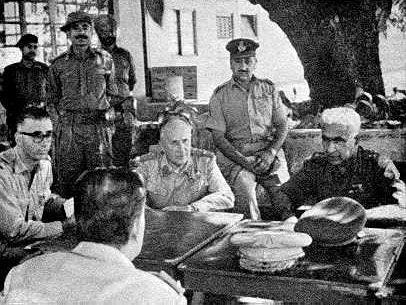
The French and the Dutch also attempted to cling on to the colonies despite the changing times.
Scoffing at the United Nation’s recommendation that it give up its Asian and African colonies, France moved quickly to consolidate its hold on the colonies of Cambodia and Laos regained from Imperial Japan after World War II. French troops were sent to fight Ho Chi Minh’s guerrillas who had challenged France’s control of Vietnam.
As France struggled to preserve control of French Indochina (1887-1954), the Netherlands was busy fighting Indonesian rebels to maintain the Dutch Colony of East Indies (1800-1949). Both European countries eventually lost the battle to keep their colonial possessions in Southeast Asia.

By the late 1950s, France was ready to compromise with the UN on the decolonization question in Africa. (French Algeria was, of course, an exception that would not be resolved until a local guerilla insurgency forced France to give up that colony in 1962).
France’s plan was to grant nominal independence to its African colonies through the instrument of the 1958 French Constitutional Referendum, which gave the population of the colonies three options:
Outright independence with severance of all ties to France
Full incorporation into metropolitan France as an oversees province
Nominal independence via membership of a French-controlled supranational entity named Communauté Française. (An entity that eventually proved unsuitable for France’s highly informal system of neocolonial control, better known by its sobriquet, La Francafrique.)
President Charles de Gaulle personally visited the sub-Saharan colonies to campaign for the third option. He was successful in getting most of those colonies to vote for nominal independence. But there were two important exceptions that were not to de Gaulle’s liking.
Guinea defied the French leader and voted for the first option—full independence and severing of all ties to France. Gabon went in the opposite direction.
Being unusually Francophile, the Gabonese colonial population was inclined to vote to become an integral part of France by selecting the second option, much to the alarm of de Gaulle, who wanted to maintain control over Gabon without the financial burden associated with overseeing an overseas province. At that time, Gabon was not a commercial petroleum producer, but it supplied the uranium that aided French nuclear bomb tests in the Algerian part of the Sahara Desert in 1960.
In response to those nuclear tests, the newly independent Federation of Nigeria expelled the French Ambassador in January 1961 and close all Nigerian sea ports and airports to French ships and aeroplanes, which severed access to the landlocked Francophone states of Chad and Niger Republic. The expelled ambassador was not allowed to return to Nigeria until 1965. But I digress.
Circling back to the 1958 French Constitutional Referendum, Charles de Gaulle, by his own admission, had a hard time convincing local political leaders in the colony of Gabon to persuade their population to abandon the idea of becoming a French overseas province and instead vote for nominal independence.
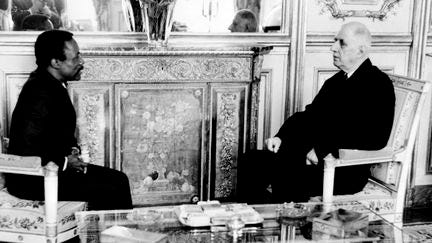
After Gabon gained its “independence”, Charles de Gaulle played a significant role in selecting senior and junior cabinet officials for the inaugural government of President Léon M’ba. One such official was Flight Captain Albert-Bernard Bongo who took a leave of absence from the French Air Force to serve in the Gabonese government. He would later retire from military service as he ascended to higher cabinet posts within government.
On 12 November 1966, he was appointed Vice-President of Gabon, a position he assumed following de Gaulle’s arm-twisting of cancer-stricken President Léon M’ba. During the final phase of Léon’s illness, Albert-Bernard served as the de facto leader of Gabon.
Shortly after the death of Léon M'ba in 1967, Albert-Bernard formally became the President of Gabon, ushering in 42 years of autocratic rule tempered with an unusual level of benignity. Bongo's presidency was characterized by massive corruption, nepotism, petroleum-driven improvements in Gabonese living standards, bribing of Gabonese political dissidents and using violence only as a last resort, employing as many Gabonese citizens as possible in the bloated civil service to put them on government payroll, to secure their loyalty, and minimize the risk of public anger or uprisings.
During the period of his long rule, Albert-Bernard leveraged Gabon's petroleum wealth to gain autonomy from his French handlers by contributing large amounts of illicit funds to the political campaigns of powerful French politicians. His money also bought him influence over French foreign policy in the Central African subregion.
Upon conversion to Islam in 1973, Albert-Bernard Bongo transformed into Omar Bongo Ondimba and gained the desired friendship of Gulf Arab monarchs. The number of Muslims in predominantly Roman Catholic Gabon rose as a result of his conversion; nevertheless, Islam continued to be a minority religion.
More importantly, Omar Bongo’s new Gulf Arab friends helped Gabon get into OPEC in 1975.
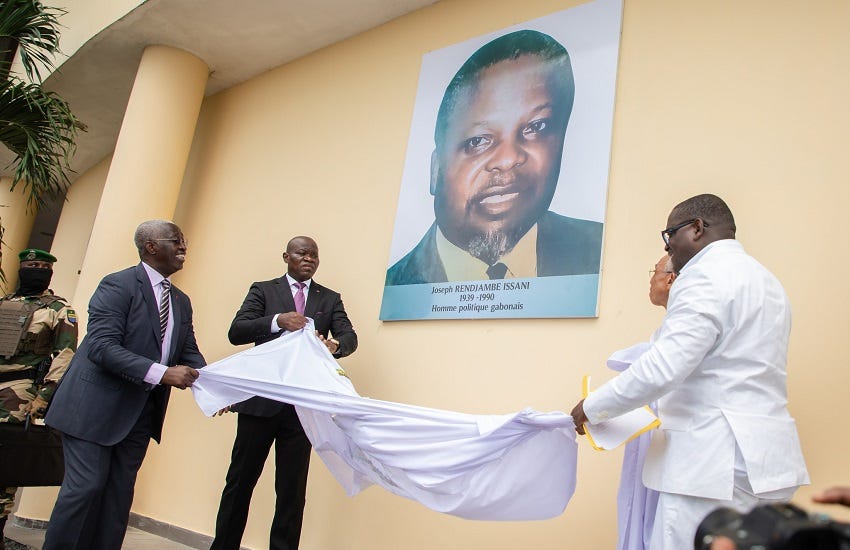
After President Omar Bongo died of intestinal cancer in June 2009, a brief power struggle ensued between his powerful daughter Pascaline Bongo and his show business son, Ali Bongo Ondimba (born Alain-Bernard Bongo).
Ali Bongo won the struggle for the control of the ruling Parti Démocratique Gabonais (PGD). He ran as the nominated PGD candidate in the August 2009 Presidential Election, winning with 41.8% of the total votes cast. The fragmented political opposition had allowed Bongo Jr. to win the plurality required to gain the presidency.
President Ali Bongo proved to be a much poorer administrator of the Gabonese republic than his late father. Under his 14-year presidency, Gabon went from having the fourth highest standard of living in the entire continent of 54 nations to the seventh highest. Youth unemployment rate refused to budge from the 30% mark. Healthcare services declined, and the problems of constant electricity supply surfaced.
After 55 years of political stability, Gabon experienced a military coup d'état on 7 January 2019. The coup was swiftly thwarted due to the decisive actions of Brigadier-General Brice Nguema the Intelligence chief.
Following the failed 2019 coup, President Ali Bongo thanked his lucky stars for his fateful October 2018 decision to replace his incompetent half-brother, Colonel Frédéric Bongo, as Intelligence chief, with his more reliable cousin.
By April 2020, Brice had been promoted to head of the praetorian guard service, Gabonese Republican Guard, to be in a better position to quash any further attempts to overthrow the government. However, in a dramatic turn of events, Ali Bongo was ousted from power three years later in a coup, this time led by the very cousin who had suppressed the previous coup.
II. THE GABON MINI-SERIES
In the aftermath of the coup d'état, both mainstream and alternative media outlets began to gloat about the end of French influence in Gabon. Clueless pundits in both types of media kept comparing the West African nations of Mali, Niger and Burkina Faso to the Central African nation of Gabon despite the glaring differences in their histories and political cultures.
The assumption that African nations are identical to one another is a blind spot that both alternative and mainstream media outlets share in common.
One also finds similar shoddiness in the manner in which the raging conflict in Sudan is being reported. Dishonest mainstream corporate media claim Russia instigated the conflict while clueless alternative media outlets claim that the instigator is the United States. In reality, the Sudanese conflict is a homegrown political affair, which had been simmering for over a decade before it finally exploded, as I explained in great details in my first and second articles on the subject.
I began the Gabon mini-series in order to explain that the 2023 coup d'état had absolutely nothing to do with geopolitics. It had nothing to do with Russophilia or Francophobia. On the contrary, Gabon has always been an outlier in French-speaking Africa for its unusual Francophile leanings.
Contrary to reports in mainstream and alternative media, the ruling Bongo Dynasty was not overthrown. Instead, its composition was merely reconfigured.
Ali Bongo was removed from power to make way for more competent members of the ruling Bongo Dynasty. As already stated, military junta leader Brigadier-General Brice Nguema is an integral part of the ruling Bongo family.
Brice has managed to gain popularity with the general populace by sacrificing certain notorious members of the Bongo family— arresting Sylvia Bongo (Ali Bongo’s wife) and Noureddine Bongo (Ali Bongo’s eldest son) on corruption charges; dismissing Colonel Frédéric Bongo (Ali Bongo’s half-brother) from the army for indiscipline.
Amidst the flurry of arrests and dismissals, Brice has steadfastly shielded his ailing cousin, former President Ali Bongo, from any further trouble since his forced removal from office. The military ruler has stated that his cousin is free to travel overseas to seek medical help for his health problems.
But that doesn’t seem to bother ordinary Gabonese people that much. The detention of Sylvia, Noureddine and several formerly powerful figures on corruption charges are enough to keep the masses content and conveniently forgetting that the military junta include other Bongo family members dressed in army uniforms.

Brice Nguema is most likely win the upcoming election without having to expend any energy on ballot fraud. He is the only serious candidate standing in the election. Veteran opposition politicians, such as 72-year-old Pierre Claver Maganga Moussavou of Parti Social-Démocrate (PSD) and 70-year-old Economics Professor Albert Ondo Ossa of Omar Bongo University, are constitutionally barred from running on the basis of their old age.
As reported in my third article, published in December 2023, Albert Ondo Ossa criticized the 2023 military coup d'état, denouncing it as a farce, an internal Bongo family affair, orchestrated by Pascaline.
I have seen no concrete evidence that Pascaline orchestrated the coup, but she has expressed happiness that her estranged younger brother (Ali Bongo) was displaced from power by her cousin (Brice Nguema).
Many Gabonese people seem to share Pascaline’s view. Therefore, on 12 April 2025, it is most likely that an overwhelming number of voters will cast their ballots for Brigadier-General Nguema who will then quit the army to assume power as a civilian President, thus restoring the ancien régime to its proper civilian governing format.
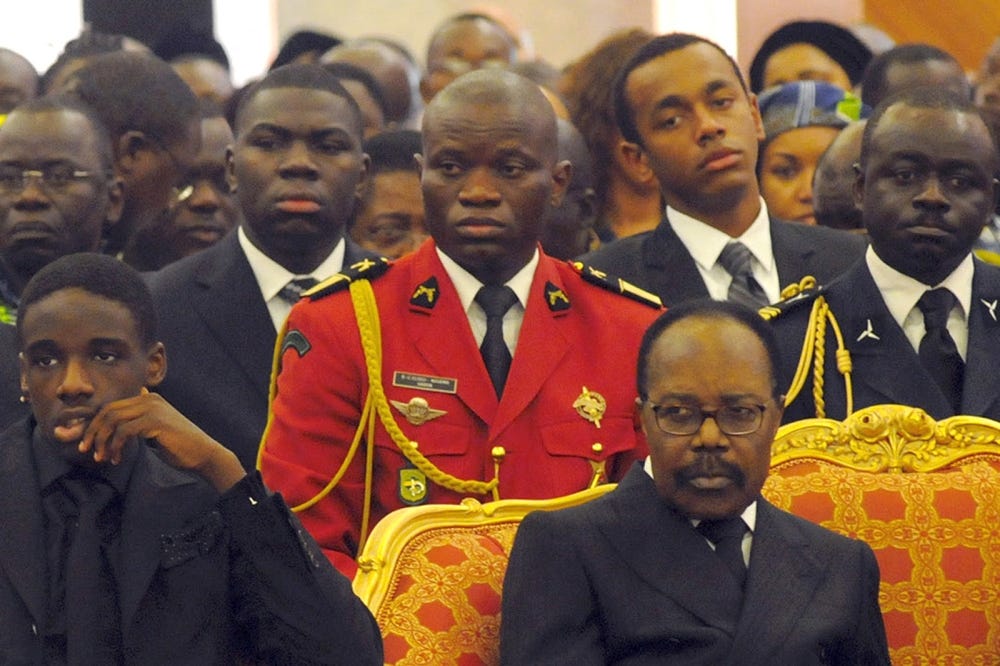
For those interested in gaining greater understanding of the unfolding events in the petroleum-rich country, I encourage you to read the articles below in the following order :
FIRST ARTICLE:
My July 2009 obituary article profiling Omar Bongo, his 42-year rule of Gabon, and his relationship to powerful French politicians. Click on the picture to read the article.
Omar Bongo Ondimba: The death of a life president
**Important Note: This article was first published in a student magazine in July 2009 **
SECOND ARTICLE:
The article explains that there are no ideological or geopolitical dimensions underpinning the 2023 coup d'état. Neither the general Gabonese population nor the new military junta expressed any hostility to France despite Macron government’s tepid denunciation of the coup.
THE COUP IN GABON IS NOT IDEOLOGICAL
Ancien régime of Gabon carries on under the guise of a military junta led by an army general directly related to the ousted civilian President
THIRD ARTICLE:
A detailed article reporting steps being taken by Brigadier-General Brice Nguema to transform himself into an elected president in order to reinstate the civilian government format of the ruling Bongo family. Brice Nguema reaches out to French government officials to assure them that relations between France and Gabon remain as good as it was prior to the 2023 coup d’état.
GABON: NGUEMA CONSOLIDATES POWER
When the coup d'état occurred in Gabon, excited voices both in mainstream corporate media and alternative media outlets began to gloat about another domino crashing in the crumbling French neocolonial system known colloquially as “La Francafrique”.
FOURTH ARTICLE:
When the next article is published, this page will be updated with the link.
*******
Dear reader, if you like my work and feel like making a small donation, then kindly make for my Digital Tip Jar at Buy Me A Coffee. You can also click the yellow image above.





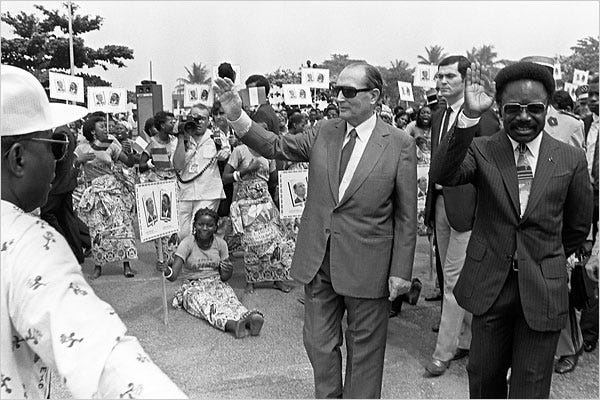

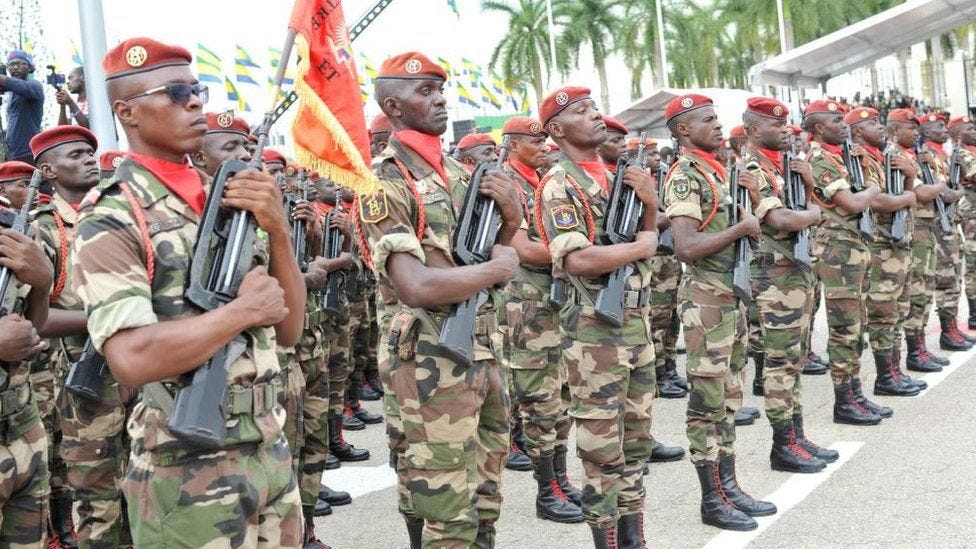

Excellent...thank you.